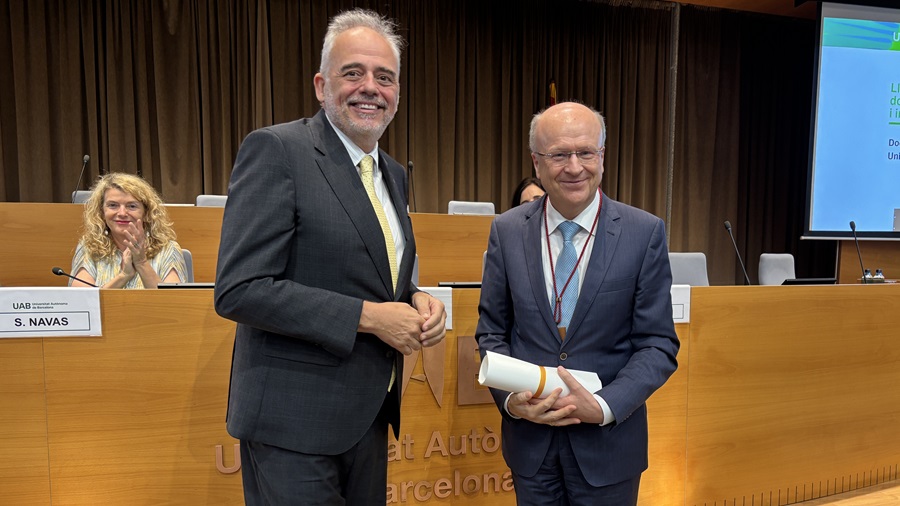The UAB expresses its gratitude to Koen Lenaerts for his commitment to Europe's fundamental values
UAB Rector Javier Lafuente expressed his gratitude for Koen Lenaerts' commitment to the "foundational values that make up the identity of the European Union". Koen Lenaerts, resident of the Court of Justice of the EU and professor of the Catholic University of Leuven, was awarded an honorary doctorate in a ceremony held at the Rectorat building of the UAB.

A European identity that “is built thanks to the commitment, solidarity and mutual trust between the member states” of the Union, as stated by the rector, taking up the ideas put forward by Lenaerts' sponsor, Gregori Garzón, professor of public international law and holder of the Jean Monnet Chair ad personam in EU Law. Both the rector and Garzón emphasised that Lenaerts' career has left “a very notable contribution in different areas of jurisprudence and an abundant doctrinal production of great relevance”.
In his master class, Lenaerts spoke about the concept of European citizenship, which has as its main “raison d'être” the fact of “protecting and promoting common European values” and is “an essential component of the identity of the Union as a common legal system”. Values that, in addition, he related to the nature of the city of Barcelona, which is the “living expression of a cosmopolitan, plural and tolerant metropolis” that “embodies the European spirit like few others”, according to the introductory words that Lenaerts pronounced in Catalan at the beginning of his speech.
According to the magistrate, European citizenship encompasses three dimensions: one relating to the rule of law, another relating to democracy and a third relating to solidarity. Regarding the rule of law, Lenaerts made a strong defense of judicial independence: “strong and independent courts are the only ones that can curb protectionist measures, often associated with illiberal regimes”. And he placed particular emphasis on how this dimension of European citizenship affects in particular the rights of free movement.
Regarding the relationship between European citizenship and democracy, the president of the CJEU stated that “Union law protects and promotes national democracies which, in turn, give democratic impetus to the European project”. These synergies reinforce various aspects of democracy: transparency and accountability, freedom of the press, the role of civil society and the protection of minorities.
Speaking in detail on each of these aspects, Lenaerts stated that “freedom of the press is not an absolute right” and the protection of democracy may require “that it be limited when media outlets engage in a campaign of disinformation and incitement to hatred”, and recalled the case between the European Commission and Hungary (associative transparency) to denounce that “by preventing funding from abroad, especially from organisations critical of the government, the activities of civil society can be seriously affected”.
On the solidarity implied by European citizenship, the new honorary doctor made a simile with Catalan popular culture by assuring that “citizenship of the Union demands a certain degree of solidarity among Europeans incompatible with unilateral and opportunistic measures, just like the castellers, who join forces to build human towers”.
Finally, Lenaerts evoked the case between the Commission and Malta (citizenship for investors), which established that the Maltese programme was “incompatible with the status of citizen of the Union” since “it resembles a commercialisation of the granting of national status of a member state and, by extension, of the status of an EU citizen”. For the judge, citizenship of the Union “is not a commodity”, and added that “no price can be put on the values of respect for the rule of law, democracy, fundamental rights and solidarity”.
A Europeanist university
In the closing speech, Rector Lafuente stressed that this honorary doctorate is the result of “the long tradition of teaching and research that our university has in the field of European studies”, as well as the “pioneering role of the Faculty of Law in the introduction of European law in teaching, and the activity of the European Documentation Centre and the Institute of European Studies”.
Rector Lafuente also stressed the strong European spirit of the UAB, which has integrated the values and institutions of the EU as “an essential element of its teaching and research strategy”. The UAB, as he recalled, “is the leading generalist university in Spain in attracting European funds” and has been recognised by the European Commission as “one of the ten most active universities” in the Erasmus Mundus programme. In addition, the UAB participates in the European Universities initiative through the ECIU University, an alliance that aims to “create a pioneering and innovative model of higher education institution at European level”.
The rector stated that “the creation of the European Higher Education Area has been an important element in the exercise of one of the fundamental rights of the EU, that of free movement” and, above all, “has contributed to the training of European citizens who are more aware of the shared values” of the EU. And he recalled that Catalan public universities recently spoke out in a manifesto against the “worrying attacks” of the US government on universities and added that institutions of higher education “must be a bastion of the free movement of ideas”.
The UAB, with Sustainable Development Goals
Peace, justice and strong institutions